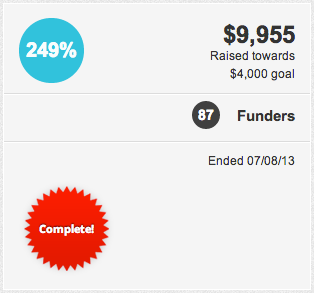
A few months ago Rickey and I ran a crowdfunding campaign on RocketHub to raise money around our idea for a high caffeine tea. We had already been working on Zest Tea for a few months and were compelled to launch the campaign when Venture for America announced its first Innovation Fund, a crowdfunding competition for the fellows. Admittedly, we rushed into the campaign and we could have done a few things better. I have compiled a list of a few things we did well, and a few things we didn't do too well. Hopefully, this guide will help some others run successful campaigns.
We'll start with a few things we think we did well:

1. Be as responsive as possible and try to be as transparent as possible. People can sniff out BS. We tried to provide as many updates as possible. We still could have communicated better.
2. Be aggressive, almost awkwardly so, in getting people to fund your campaign. It's frustrating when people tell you they're going to fund your crowdfunding project and then don't do it immediately. At times, I forgot that this campaign wasn't as important to them as it was to us. The short of it is that it's not a top priority for people, even well intentioned friends and family, so stay on them. Of the people that eventually funded the project, I reached out to each 3 - 5 times. I had a list of 250 'prospects' and reached out to each about once per week. In the end, about 60% of my donors were from our first network. I’m sure this ratio shrinks as the size of the crowdfunding raise increases.
3. Do a ton of research on what works in crowdfunding, there's too much great material on the subject for me to summarize quickly. For a quick intro, check out this ‘Kickstarter Equation’ class on Udemy.
Now for a few things we didn't do so well:
1. Begin developing a community well before launching the campaign. Try and get friends/ family to agree to commit prior to the launch and launch strong. We should have been pushing the concept of a high caffeine tea long before introducing people to the idea via our campaign.

2. Develop an outreach plan prior to the beginning of the campaign. Figure out which bloggers/ local press you want to reach out to and how you will market your campaign to these reporters. That being said, you're probably going to be disappointed by the amount of funding that results from press. While there was a low conversion from press to funders, the exposure did lead to some awesome business connections.
3. Think through your brand image prior to launch. When people think of your company what do you want them to think. Hopefully this image is greater than your initial product. For example, people think of beautiful design, and 'it just works' when they think of Apple. That's why Apple isn't restricted to selling computers. Here's a great TED talk on the subject. We focused much more on the product than the holistic company.
4. Put a lot of time into crafting the story you're going to tell. As cliche as it sounds, people fund the project as much for the person and story as they do for the product. We figured this one out too late and struggled to tell our story as the campaign was live. Along these lines, put significant effort into making an awesome and inspiring video. I was never the biggest fan of our video and it made me feel apprehensive about sharing it widely. I shared it anyways, but I wish we had put more time into production. It's also a lot easier for other people to share the video/story if they don't feel awkward about it and/or truly believe the story.
Our raise was relatively small (under $10,000), but it was enough to get Zest from a concept to a physical product on the market. Since our campaign ended, I've worked with a few other campaigns that went on to raise significantly more money and most of the lessons still seem to apply.
The campaign was a ton of work and ate up the better part of a month, but it helped fund the development of our company, so I’d say it was worth the time and frustration. Who knows, maybe we’ll run a larger crowdfunding campaign when we decide to ramp up production.
Do you agree, disagree, or have any other suggestions?
Our So-so video:
http://vimeo.com/67234853